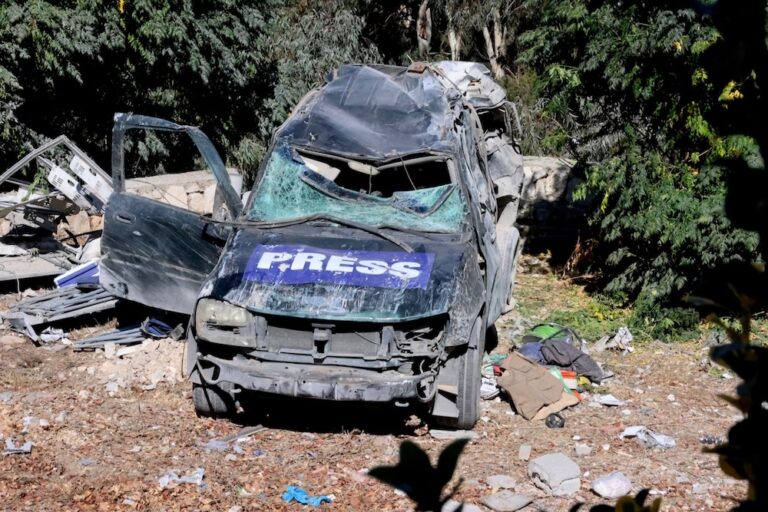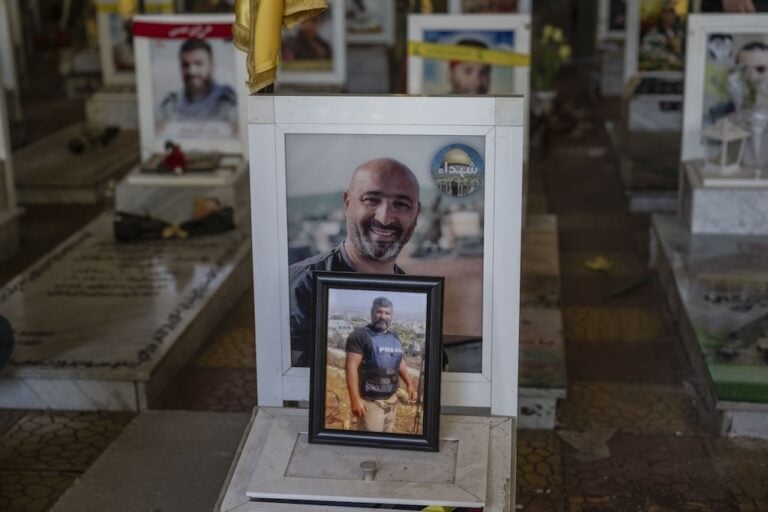Israeli airstrikes have worsened network connectivity in South Lebanon, isolating residents from vital information.
This statement was originally published on smex.org on 28 October 2024.
Two Israeli airstrikes have targeted the “Burj Awdeh” building in the city of Tyre in South Lebanon. The first occurred on September 29, and the second on October 7.
The airstrikes resulted in multiple injuries and fatalities while also destroying the Takch Group’s internet station, one of the area’s largest. This disruption has severely impacted network connectivity across the city and surrounding areas.
“As a result of the airstrike, landline internet was completely cut off, cellular data from ‘Alfa’ was cut off for three days, and cellular data from ‘Touch’ was cut off for one day before returning with a very poor signal,” declared Ali Qarouni, who decided to stay in Tyre despite the violent bombardment of the city.
If the Israeli airstrikes did not force the residents of Tyre to leave, then the internet blackout did.
“Internet outage isolates us from the world and increases our anxiety. We cannot accept or cope with this,” Mohammad Qdado told SMEX.
Scale of damage and network outage
The Internet outages extended beyond Tyre, worsening the already weak service provided by Ogero across many Lebanese regions, which were impacted by Israeli aggression or increased pressure on generators.
“Two points connecting 26 service centers across Lebanon went out of service because continuous airstrikes prevented us from reaching them to carry out repairs and maintenance,” explained Imad Kreidieh, Ogero’s General Director.
“We continuously coordinate with the Lebanese Armed Forces and UNIFIL to allow us to enter relatively safe areas and conduct repairs, but we avoid areas that may put the lives of our employees at risk,” added Kreidieh.
“But this only affects around 10% of our subscribers, with more than 90% of our network providing internet and telecom services as usual.”
Although most of the user base is unaffected by these shutdowns, Ogero should still bear the responsibility of this disenfranchised minority.
In Lebanon, 10% of almost 5,819,604 million people is nearly half a million, a large number to consider the impact on the individual scale.
State revenue also diminished due to decreased internet consumption (26%). This decline makes sense, according to Kreidieh, since almost a third of the population has been displaced so far. People were forced out of their places of residence, where they mostly used landline internet, to shelters where they could only rely on cellular data or shared WiFi.
Like Ogero, mobile phone companies reported similar problems.
Alfa told SMEX that 130 stations are currently out of service due to either shelling or technical teams’ inability to reach the sites for repairs, maintenance, and refueling. Israeli airstrikes have also damaged 21 transmission sites belonging to Lebanon’s second network provider, touch.
No alternative solution
In November 2023, Minister of Telecommunications Johnny Corm and Prime Minister Najib Mikati discussed a contingency involving a potential deal to provide satellite internet devices through Starlink, affiliated with the American company SpaceX.
Several members of parliament rejected the plan as being suggested at a “suspicious time,” and some had reservations about “the entity providing the service.” They also described it as “lacking public benefit.”
Instead of addressing the gaps in the contingency plan, the alternative solutions became utterly absent.
“There is no alternative plan for wartime. We rely on the ground network, and our only resort is to rebuild and repair, but it is unfortunately impossible due to the ongoing Israeli aggression,” admitted Kreidieh.
Kreidieh has also previously expressed concerns about Ogero’s insufficient budget to address these problems: “We are working with less than the usual resources.”
Alfa and touch have previously attempted to create plans in the face of the crisis, such as touch’s emergency licenses in main transmission stations covering “safe” areas.
This initiative aims to enhance the capacity to accommodate the significant influx of displaced individuals. According to their statements, equipping those stations with a third control channel would allow them to maintain a satisfactory user experience in safe areas.
Alfa also told SMEX that it had redistributed resources and capacities among stations, increasing capacity in areas hosting displaced people. It has also activated National Roaming with touch in southern border areas such as Bint Jbeil, Marjeyoun, Tyre, Hasbaya, and Baalbek-Hermel in Bekaa.
Displacement and internet outage
Residents of South Lebanon have reported more cases of internet and communication outages across larger areas amid intensified Israeli aggression.
In an interview with SMEX, Zeinab Hijazi, from the southern town of Maarakeh, Tyre district, shared that internet shutdowns lasted days and isolated her and her family from the rest of the world.
“Internet outages not only cut our communication from others, but they also prevent us from using social media that have helped us relieve some stress and stay informed on what’s happening,” admitted Hijazi.
A municipal source from Maarakeh confirmed that the communication shutdowns were caused by a lack of diesel to power the station.
“We rushed to procure diesel and supply the Ogero station to resolve the outage issue,” said the source. He also clarified that “a private company provides landline internet to town residents, but Israeli strikes have also destroyed some of its cables.”
Ahmed, a resident of Habbouch in Nabatieh, is demanding free internet and communication services during the war.
“Access to the internet and communication services is urgent and indispensable, especially during war. Providers have to consider the financial circumstances of people from the South who have lost their jobs and homes,” he shared.
Many people are concerned about how communication shutdowns affect the work of relief organizations, which would be difficult to reach in blackouts. What is their purpose if people cannot communicate with the Red Cross or Civil Defense?
Weak networks hinder press activities
The internet and communication networks in South Lebanon, if available at all, are very weak. This significantly affects the work of the press, which relies on communication services to spread the news.
“I had to leave my home in Houmine el-Fawqa, Nabatieh District, due to a complete internet and communication shutdown,” explained Mohammad Zeinati, an independent journalist.
“My work depends on transmitting live news and messages via Zoom. I also need to send high-resolution videos. In my field, news and video transmission speed is of utmost importance, and lack of internet and communication disrupts my job.”
Zeinati moved to Sidon and commuted long distances daily to reach southern villages to film and produce content. In doing so, he faced substantial costs and major security risks.
The real threat facing him and his colleagues, he claimed, is the lack of signal on certain roads or valleys, which prevented press workers from calling relief teams if they were targeted or injured.
Bilal Qashmar, a journalist, shared Zeinati’s concerns.
“Weak internet prevented me from sending the media material I had prepared while covering an airstrike on Qana. I had to return late to Tyre to send them, but they had lost much of their media value.”
Qashmar explained that he bought an Alfa SIM card, alongside his Touch line, to ensure internet around the clock, emphasizing that “remote workers have done the same,” despite communication fees in Lebanon being among the highest in the world.
The role of local authorities in facing the crisis
Most local officials contacted by SMEX agree that the main problem facing internet and communication services is difficulty supplying stations with diesel fuel.
“We have seen limited direct targeting of telecommunication towers in Tyre or neighboring towns so far,” explained Hassan Hammoud, Vice President of the Tyre Municipal Union and the Mayor of Burj Rahhal.
“Municipalities are seeking the help of Civil Defense and scouts to supply stations with diesel to keep them running.”
“We also face the obstacle of securing the cost of diesel,” he added. “The Municipal Union covers these costs, and the Governor of the South Governorate has informed us that Touch and Alfa will reimburse them.”
“But the war has made it very difficult to transport diesel from areas outside the Litani River to areas within it.”
With the escalation of brutal Israeli aggression on Lebanon and the possibility of a prolonged war, internet and communication shutdowns are likely to happen in more areas, which could be catastrophic for people in Lebanon.
Where is the contingency plan the Lebanese government promised its people? Will the state remain inactive as ministers wallow over “insufficient budgets”?



